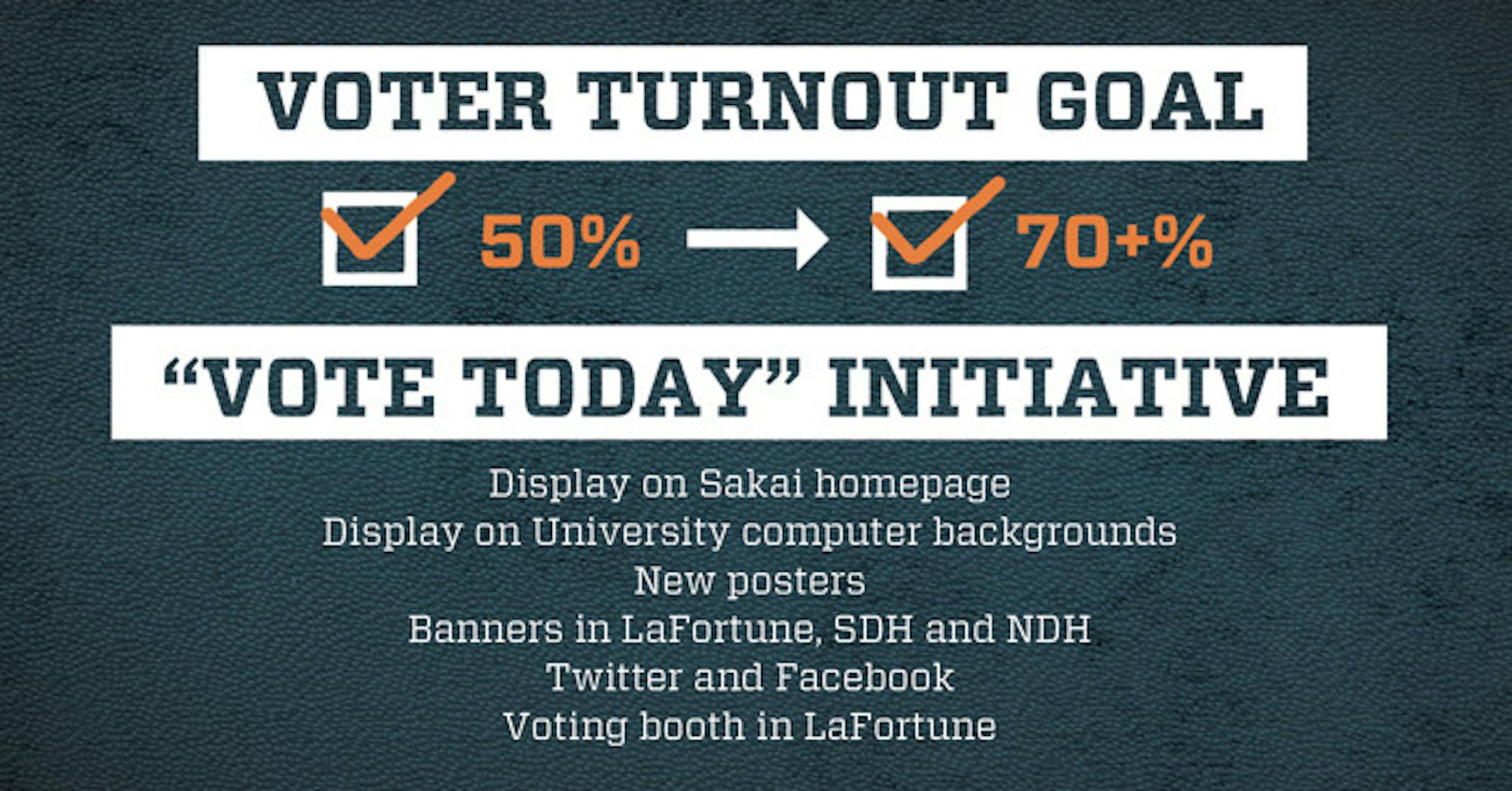The Judicial Council has developed a campaign designed to better advertise and simplify the voting process for next week’s Student Government primary elections, Junior Kathryn Peruski, vice president of elections said. The Council hopes to use this plan to increase voter turnout, she said.
A seven-member Election Committee appointed by the Judicial Council has been working on the “Vote Today” campaign since last spring, which incorporates new strategies for reaching student voters and encouraging them to vote, Masi said.
“If there’s not enough publicity, people won’t know about the election,” Peruski said.
Masi, President of Judicial Council, said “Vote Today” focuses on advertising elections through redesigned posters, banners in LaFortune Student Center and both dining halls and communication through email, Twitter and Facebook.
“The big push is ‘Vote Today’ because we are actually encouraging people to turnout on Election Day,” Peruski said.
Judicial Council is also working with the Office of Information Technology to advertise the elections on Sakai homepages and on screen backgrounds of University computers, Masi said.
“We’ve been trying to rebrand Judicial Council,” he said. “It’s been about increasing [student] awareness of elections.”
Peruski said for the first time, in addition to the digital ballot, a physical voting booth would also be in LaFortune on Election Day, Wednesday, Feb. 5.
The final element of the “Vote Today” campaign includes direct outreach to student organizations and hall councils to communicate election details, Masi said.
Peruski said students should appreciate the impact of their votes in this election.
“It’s important for students to vote because [the elected students] do represent you for an entire calendar year,” Peruski said.
Senior Michael Masi said Judicial Council has long been working to increase the disappointing turnout from undergraduate students in the elections it oversees.
“Voter turnout practically hovers around 50 percent, which we find unacceptable for the Notre Dame undergraduate student body,” Masi said. “It’s never as strong as we would like. We would like upwards of 70 or 80 percent.”
Masi thinks the busy schedules of Notre Dame undergraduate students may account for the low turnout, and that publicity of elections and explanation of differences between candidates can help combat this issue.
“Part of our problem is we have a campus full of leaders, and they’re very committed in what they’re doing, and they don’t look beyond their organizations,” he said. “We are very busy students and we don’t have time to know what’s going on.”
Masi said correcting this trend of low turnout would put student leaders in a stronger position when Student Government meets with University leaders.
“This is the students’ chance to choose a representative for them. Student Government leaders meet with administrators on a daily basis, and if we have less than 40 percent of students voters, it sends a weaker message,” Masi said. “Higher turnout allows greater engagement and gives greater authority to get things done. This is the opportunity for students to express their interests in what they care about on a greater scale.”
Masi and Peruski said attending the election debates Monday at 8 p.m. in the basement of LaFortune offers the best way to learn about this year’s candidates for Student Government. Masi also said that better coordination with Student Government helps increase student awareness of its elections.
“It’s a group effort. Judicial Council needs to work with Student Government and candidates to make sure the students know what’s going on. If all of us work together, we can increase engagement,” he said.
Statistics on student voting have been available to Judicial Council only for the past three elections, since the Council took over the physical ballot recording process from OIT and created a Google form for digital voting, Masi said. .
He said this new format allows for easier distribution of the digital link to the ballots, both on the Judicial Council website and through email, and allows the Council to oversee the process and results.
“That way the data is all in-house … if there are allegations of election misconduct, we can look at the data,” Masi said. “It seems to work really well and candidates seem to like it.”
Masi said that although he does not have concrete statistics, he believes seniors vote at lower levels than any other class. Masi said he believes it is either because they think they cannot vote or because they do not care, but he encourages them to take the time to vote.
“Seniors, it’s like leaving a legacy,” he said. “If you care about the future of Notre Dame, it’s important to vote.”
Beyond a general apathy with Student Government, Peruski said dwindling membership on the Judicial Council Listserv makes it hard to distribute the voting link during the election, which only lasts from 8 a.m. to 8 p.m. on Election Day.
Primary elections for Student Government representatives will take place on Wednesday, Feb. 5. If no candidate receives a majority of votes, a run-off election between the two candidates who receive the highest numbers of votes will occur Monday, Feb. 10.
Judicial council launches voter plan
STEPH WULZ | The Observer









